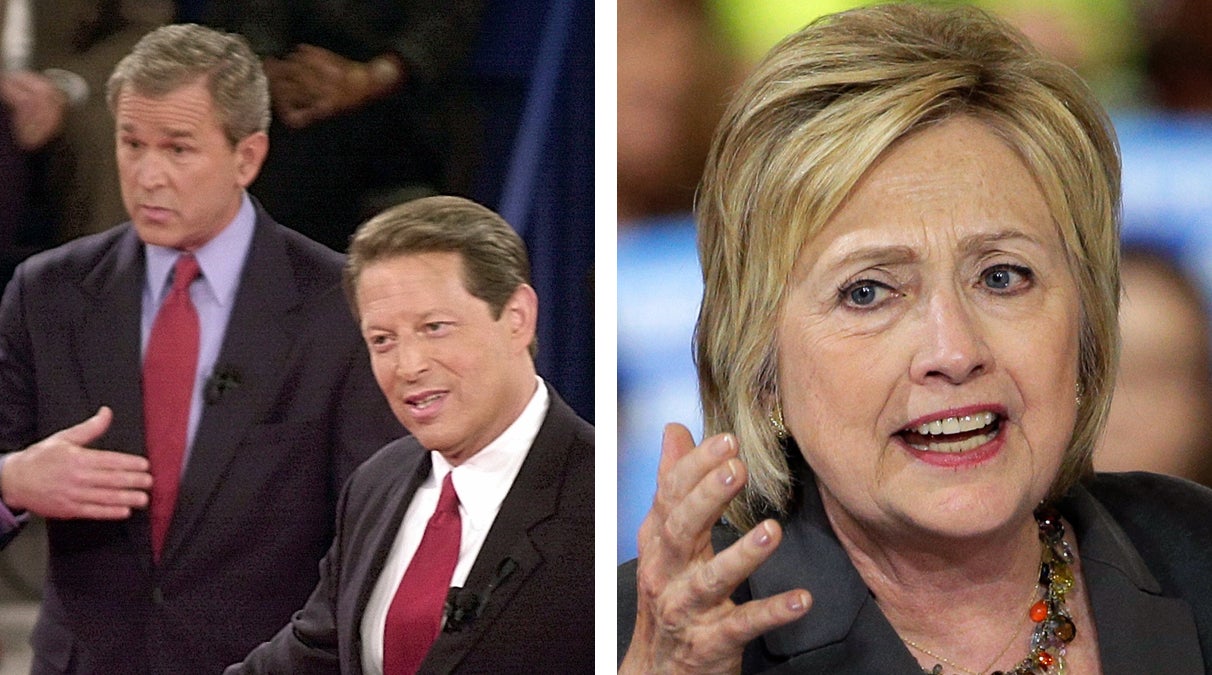Advice for Hillary Clinton: Don’t Gore yourself

Left: Democratic presidential candidate Vice President Al Gore is shown debating Republican presidential candidate Texas Gov. George W. Bush (in background) on Oct. 17
While writing about presidential debates, a wise man once cautioned that “most viewers don’t sit in their living rooms with a scorecard, marking off debating points won and lost. They’re looking for a candidate who meets their conception of a president, someone who appears to be in command … in a manner befitting the office. Viewers often react impressionistically to these events, [so] never underestimate the importance of style.”
Wait, that was no wise man! That was merely me — writing 16 years ago on the eve of the first clash between Al Gore and George W. Bush.
And how fitting it is that I’m referencing that debate, because on the eve of Trump-Clinton, I’m getting Bush-Gore vibes all over again.
I’ll explain why in a moment, but first we need to stipulate a few things about these presidential debates:
They’re typically hyped as potentially pivotal, but polling has long shown that few viewers switch allegiances on the basis of debate performance.
Roughly 95 percent of what gets said is almost instantly forgotten.
Viewers don’t pay much attention to policy talk, because they assume — often correctly — that policy promises will die in the next Congress.
As I said in that ’00 article, these events are primarily about style, not substance.
The most memorable thing about the 1980 Reagan-Carter debate was not anything that challenger Reagan said about issues; rather, it was his perceived sense of command when he repeatedly (but affably) needled the incumbent president with the line, “There you go again!” What apparently mattered most in 1960, at the dawn of the debate era, was Richard Nixon’s pallor, not whether or not he bested John F. Kennedy while discussing at great length the political status of two Chinese islands, Quemoy and Matsu. (Nobody since 1960 has ever discussed Quemoy and Matsu.)
But today, it’s the first Bush-Gore debate that seems most apt — for reasons that should ring a bell. In that race, a seasoned Democratic understudy with decades of executive and legislative experience was matched against a semi-articulate Republican who was widely viewed as a policy dolt. The Democrat was steeped in the nuances of policy; the Republican, who had zero Washington experience, typically took refuge in rote talking points and vague platitudes. Many observers assumed that when they met in debate, the Democrat would win with ease, on sheer brainpower alone.
But Al Gore did not win. He turned off a lot of viewers, not because of anything he said about policy … but because he sighed too much. I kid you not.
Remember, these events are all about style. It seemed like every time Bush said something, Gore voiced exasperation. It was clear that Gore considered himself to be Bush’s intellectual superior, and he exuded that ‘tude in a condescending manner. That first debate wound up hurting Gore, especially with women — it’s considered one of the few debates that really did move poll numbers — because, let’s face it, a lot of Americans don’t like know-it-alls. As political analyst Ross Baker told me right after that debate, Gore’s constant sighing “was like the response you might have gotten from your fourth-grade math teacher after you gave the wrong answer in long division.”
In other words, tonight, Hillary Clinton needs to guard against Goring herself.
Yes, she has the overwhelming edge on policy smarts (her campaign website is festooned with detailed proposals on everything from climate change to pre-K education); yes, she was toiling in the policy vineyards back when Donald Trump was scoring babes and spending daddy’s money; yes, her opponent is a dangerous ignoramus whose infauxtainment candidacy is a disgrace to the Republican party and a dark stain on this fragile democracy. But if she comes off as a know-it-all, the Wellesley girl who did her homework in order to nail the knucklehead, she risks turning off a lot of viewers.
If she can humiliate him that way, personally I’d be fine with it. Actual qualifications should count for something, right? But fairly or not, there’s a strong strain of anti-intellectualism in this country, and there’s considerable sexist hostility toward smart women. So somehow — and we’ll see whether she has the moves to thread this needle — Clinton has to confront Trump’s lies and ignorance without exuding condescending disdain. In the words of Trump’s ex-ghostwriter, Tony Schwartz, she needs to “save the country and the world from a guy who is exceptionally dangerous” – in a way that makes people feel better about her.
Which brings me to my fifth stipulation about tonight’s debate: What the candidates say tonight — about themselves, and, more memorably, about each other — will probably matter less than what the mainstream media says all day tomorrow. Like Gore in 2000, Clinton’s main handicap is that, by dint of her smarts and seasoning, she’s “expected” to do well; the risk is that anything less than that will be media-spun as a “loss.” And as for Trump, the bar is set so artifically low — his people say he has barely cracked the briefing books — that if he doesn’t rant or puke his junk food, he will somehow have exceeded expectations enough to “win.”
Will some in the media fall for that con? Sure, why not. As CNN’s John King lamented a couple weeks ago, when the cable networks got suckered into broadcasting Trump’s D.C. hotel infomercial, “We got played again.” And there’s always next time.
—
Follow me on Twitter, @dickpolman1, and on Facebook.
WHYY is your source for fact-based, in-depth journalism and information. As a nonprofit organization, we rely on financial support from readers like you. Please give today.

